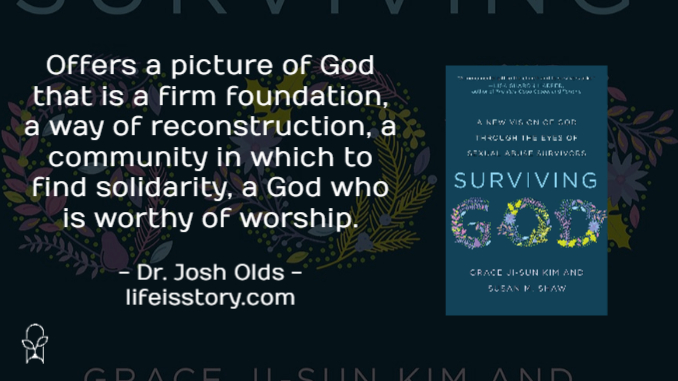
Published by Broadleaf Books on March 26, 2024
Genres: Non-Fiction, Christian Life, Theology, Social Justice
Buy on Amazon
Goodreads

Who is God when we see God through the eyes of survivors?
Many books have dealt with sexual abuse scandals in the church and the role of pastoral care for survivors. Others have provided liberatory readings of biblical texts to support survivors of sexual violence. Surviving God takes a new approach, centering the voices of sexual abuse survivors while rethinking key Christian beliefs. Starting from experiences of oppression, beliefs that contribute to oppression are challenged, and new, hopeful, and healing beliefs take their place.
Groundbreaking theologians Grace Ji-Sun Kim and Susan M. Shaw, each a survivor herself, demonstrate how traditional ways of thinking about God are highly problematic, contribute to the problems of sexual abuse, and are not reflective of the God of love and justice at the heart of the gospel. These long-held theologies often perpetuate the problem of sexual abuse and fail to promote healing for survivors. Drawing from their own experiences and the experiences of other survivors, and centering the ways gender intersects with race, sexuality, class, and religion, Kim and Shaw lead us to deep healing and a transformed church that no longer contributes to the devastation of sexual abuse. In these inspiring pages, you will discover new ways of thinking about God that are surprising, challenging, and empowering.
When I told my wife the title of this book, Surviving God, she asked “Do they mean that God survives bad interpretation of who they are or that people survive bad interpretations of God?” It’s an excellent question and one that the authors, Grace Ji-Sun Kim and Susan Shaw, answer with an emphatic “Yes!” People are harmed by the weaponization of God’s name and power for immoral and unjust purpose—and there is survival that can come from that. God’s name is harmed by those who take their name in vain—but who God is survives that. Surviving God is a reminder that, even if you have been torn apart by those claiming the name of Jesus, there is also healing, hope, and justice in that name.
While Surviving God focuses primarily on those who have survived sexual abuse, Kim and Shaw portray the toxic systems of religion that lead to the patriarchal power structures that create the environment for abuse in a holistic manner. That is to say, even if you are not the victim of physical sexual abuse within the church but have been part of a religious system that has disempowered you because of your (gender, orientation, ethnicity, social status, etc.), this book provides a path toward hope and healing.
Kim and Shaw begin by telling their own stories, both personal and professional. Grace Ji-Sun Kim is a theology professor and ordained minister who grew up in a conservative Korean church in Canada. She writes that her professional journey has been one grasping for healing from the racism she encountered within the culture and the sexism she encountered within the church. Susan M. Shaw is a professor of women, gender, and sexuality studies who grew up in a fundamentalist Baptist church. She writes that her professional journey has been one of finding a place where her life and her talents were accepted and loved. Both have personal experience with abuse. Early on in the book, they write: “We’ve not only survived our abuse; we’ve survived the abusive God of our childhood and churches that forced images of a violent God upon us.” Surviving God speaks to survivors as survivors and from survivors, offering healing and solidarity.
After some introductory work setting up the context of the problem, Surviving God turns to a pair of chapters that talk about God as the problem and God as the survivor. Pairing these chapters together is especially important. Kim and Shaw do not shy away from the fact that, in some interpretations of Christian religion, God is problematic. God allows abuse. God is violent. God is demeaning and damning. And when sexual abuse happens, and the all-powerful God does not stop it, and Christians say things like “God works all things together for his good,” it becomes very difficult to believe in God. Contrasting that, Kim and Shaw show how this is a bad view of God and point us toward a God who suffers with us and calls for an end to all suffering.
Next, Surviving God goes on a comprehensive overview of sexual abuse in Bible with chapters on figures from the Old Testament and New Testament, and a chapter focusing on sexual abuse in the life of Jesus. Some of these perspectives are eye-opening and completely different from the sanitized and/or weaponized versions of these narratives that evangelical Christianity has held. Kim and Shaw write with conviction, clarity, and compassion, making a strong case for a God who understands, condemns, and works for the end of abuse.
Surviving God’s end message is that God can be survived and that God survives. As I’ve grown up and moved away from toxic representations of God—much like the authors—I’ve also witnessed so many around me do exactly the same. Deconstruction. Ex-vangelical. Whatever you want to call it. But they have nothing to reconstruct from. While they have removed themselves from toxicity, they have no place of flourishing to join. And so they wander. And wonder. And wallow in lostness. Surviving God offers a healing picture of God that is a firm foundation, a way of reconstruction, a community in which to find solidarity, a God who is worthy of worship.
